Eat like a king: It’s all about tandoor, tawa, dum at Kebabs & Kurries’ special Awadhi menu
Crafted by Masterchef Mohammed Shareef, the week-long special offering at ITC Gardenia’s Kebabs and Kurries puts the best of the Awadhi cuisine on the table, and it’s as royal as it gets.
Nothing speaks Awadh more than kebabs that melt in your mouth and lamb meat that would fall off the bone if you just whispered to it.
At ITC Gardenia’s Kebabs and Kurries, it’s a week-long celebration of everything Awadh, as celebrated chef Mohammed Shareef showcases the best of the region’s cuisine.
Having worked at the ITC chain of hotels for over 35 years, Chef Shareef has curated a special menu inspired by the time of kings and royalty, as they travelled across the Awadh region of Uttar Pradesh and ate lavish spreads cooked in tandoor, tawa, and dum.
The restaurant—one of many housed in different branches of the hotel chain across India and abroad—plays to the royal vibe. It adorns pillars that would otherwise belong in a palace, vintage cooking vessels, rugs, and a statue of the Sun—a marker of kingship in India. The ceiling is decked with wooden beams and designs that place you right in the royal bed chamber.
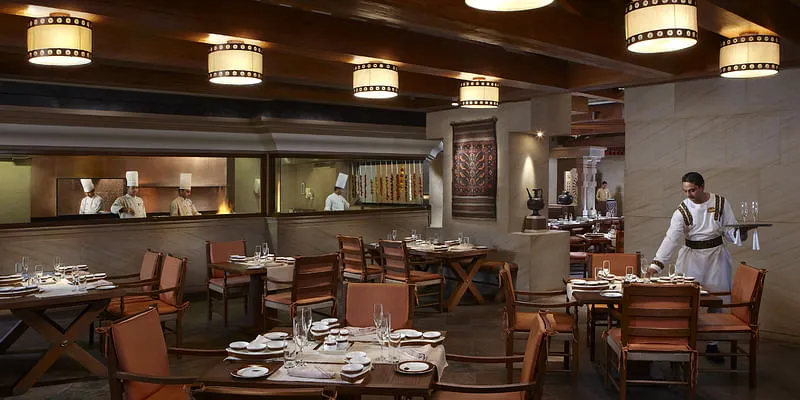
The special menu is largely a meat-based offering that takes its cue from Central Asia—where the Awadhi cuisine originated and found its home in the Great Indian Plains.
Although the special menu has vegetarian concoctions, Hari Mirch Matar ke Kebab is one of those starters that one simply can’t forget. The kebab falls apart as soon as you put it in your mouth, its pea mould revealing a nutty surprise.
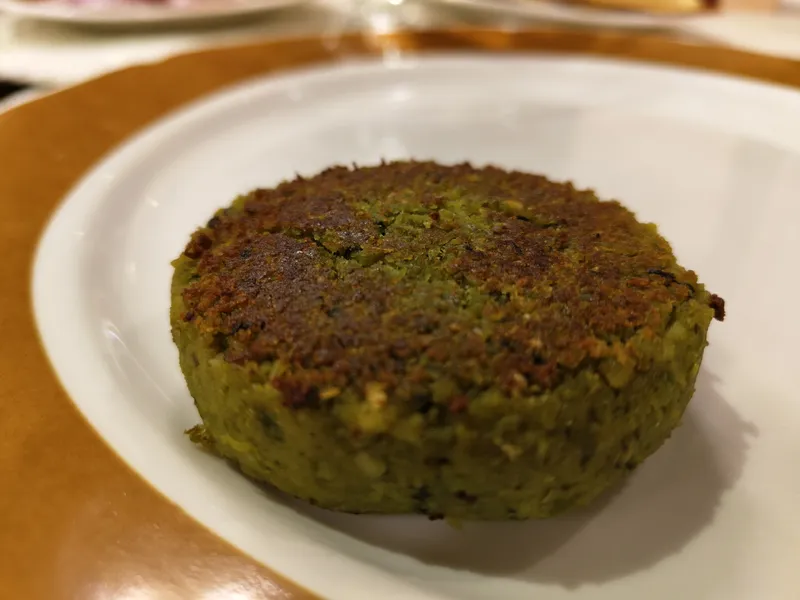
Hari Mirch Matar ke Kebab
It doesn’t pack the green chilli’s heat but lets it ebb a little after you’ve had the morsel—making it a perfect winter delight.
Bhuttey ke Kebab also fits the season. It’s made with mashed corn kernels, cooked to perfection, and oozes a hint of their sweetness but can’t save you from the wave of garlic that dominates your palate in the end.
The best thing about the appetiser is its crust, which even though starts to crumble, holds steady, unlike Matar ke Kebab.
The nawabs brought with them Central Asian and Persian cooking that relied more on the meat for flavours than adding many spices. A perfect example is Murgh Kalmi Kebab—a chicken drumstick that’s marinated in a yoghurt-based mixture. While the yoghurt hugs you, it’s the juices of the chicken that you get to savour.
On the other hand, Machli ki Seekh is packed with spices that balance out the intensity of the freshwater sole fish and spread it all over.
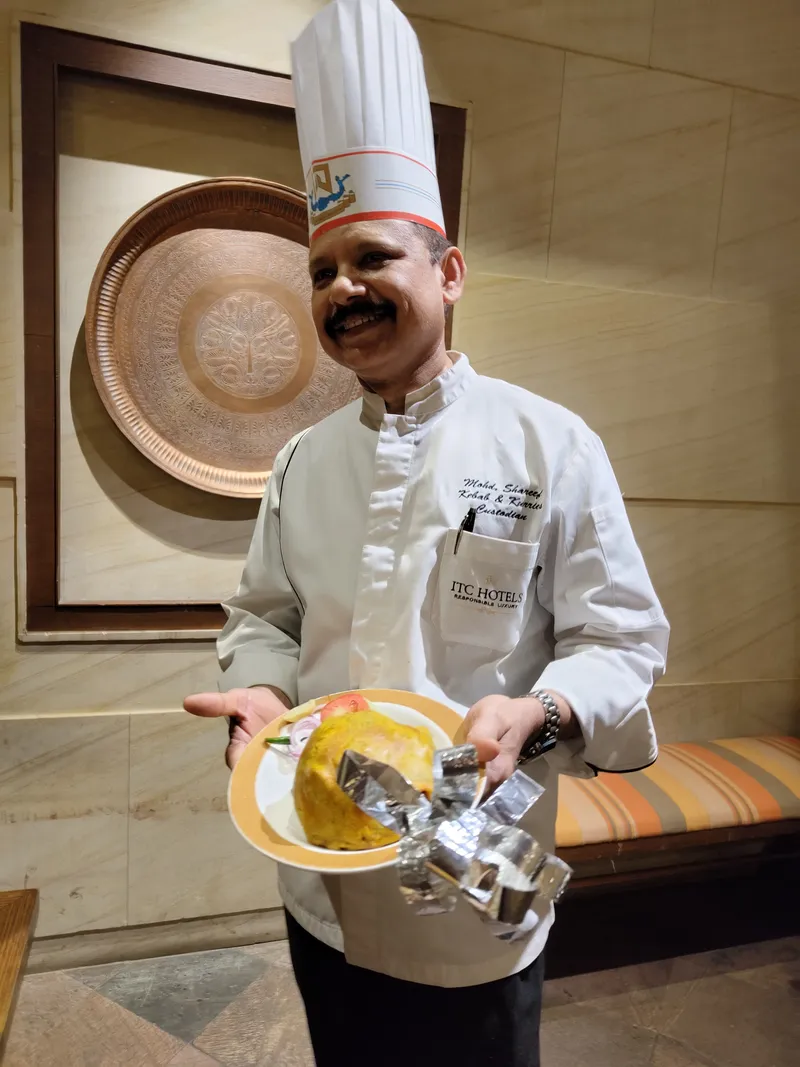
Chef Mohammed Shareef holding Dum ki Raan
Chef Shareef’s favourite though is Dum ki Raan, and one can see why. It’s the most performative and visually appealing dish—serving the whole leg of spring lamb encased in Sheermal dough.
When the lamb is cut open, the aroma makes you want to dig right in and savour the meat, cooked so tenderly it shreds apart and melts your heart. The dish is layered with spices that hit your palate right, leaving you wanting more.
When it comes to the main course, Dal Harra Moong Mughlai presents as an almost homemade green lentil concoction, layered with a hint of sweetness and tempered with garlic.
Chef Shareef puts a selection of his own spices in the dal—a recipe only he and his two sous know about, as is the case with the rest of the menu.
Next is the Tursh E Murgh—a boneless chicken dish in a rich green gravy that’s surprisingly light on the palate. The chicken is very creamy, and hidden inside is a chilli surprise.
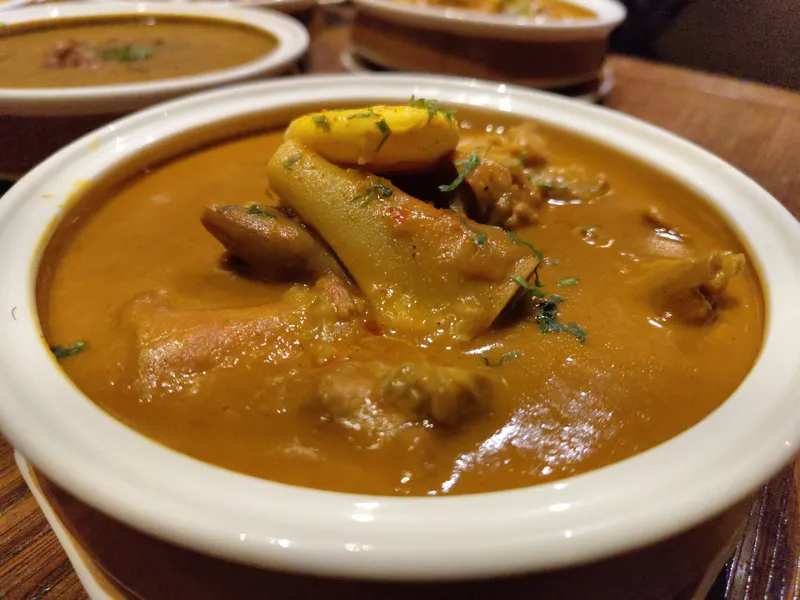
Gosht Qundan Qaliyan
Meanwhile, the Gosht Kundan Qaliyan is not as subtle. Its thin gravy packs pepper but doesn’t let it overpower the palate. The baby lamb meat is tender to the bone and pairs well with Naan-e-Bakhumaach—a thick but fluffy bread that’s sprinkled with cumin seeds.
The curry is king here, with its rustic flavours making one go back for seconds over and over again, and perhaps best represents what the special menu is trying to emulate—eat like the kings.
Awadh cuisine, however, isn’t complete without biryani.
Serai Gosht Biryani offers lamb cooked on dum and pairs it with Burhani raita. While the biryani isn’t too spicy and relies on its rich and rustic flavours, the raita shocks your palate with roasted garlic—a theme that has been running all over the menu.
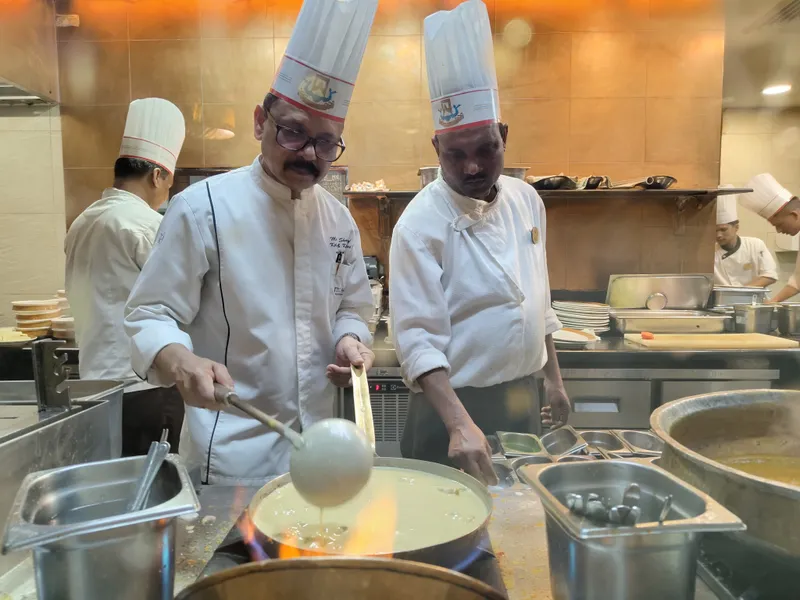
Chef Mohammed Shareef (left) preparing Tursh e Murgh
The lamb meat is, again, tender and juicy, and its crust gives a bite that one can just eat by itself. The raita though is unforgettable; the garlic finds its way around the biryani and brings a lost soul home.
For dessert, Chef Shareef serves Gulab ki Kheer, which isn’t sweetened with sugar but makes use of honey. It’s like eating gulkand but in a kheer form and is paired well with the pistachio crunch.
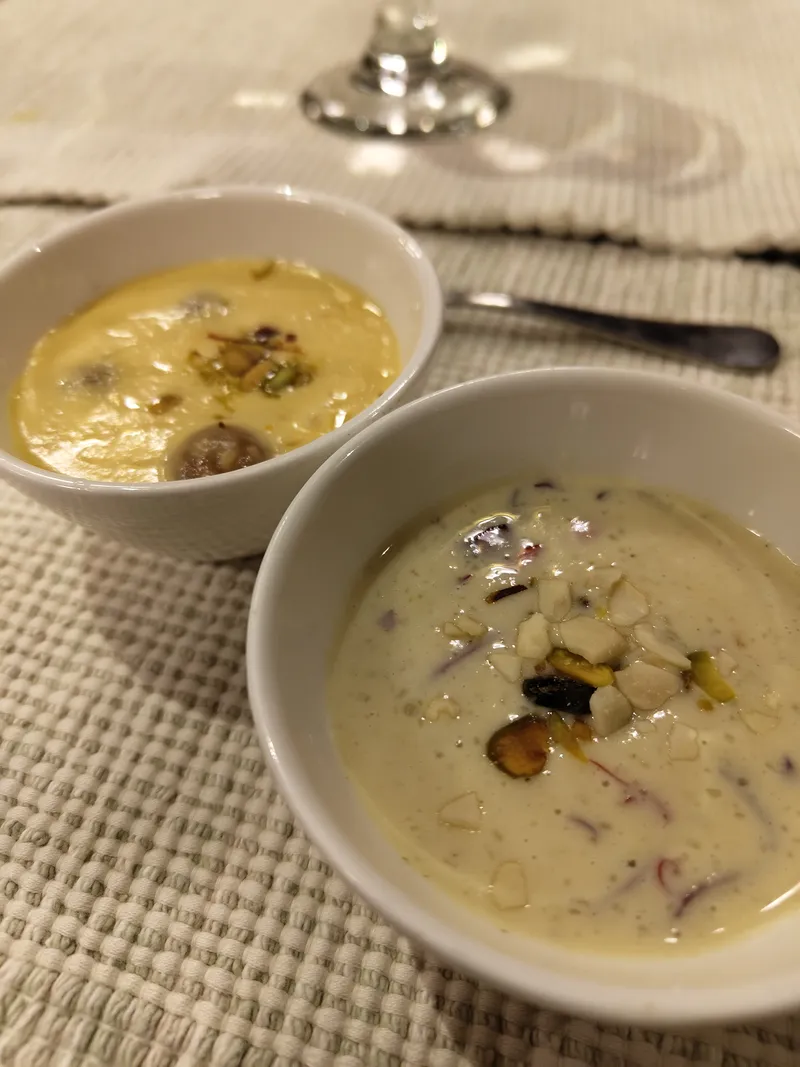
Zauf e Shahi (left) and Gulab ki Kheer
But nothing screams ‘royal’ more than Zauk e Shahi—unsweetened rabri containing small gulab jamuns, as soft as a pillow, that you can rest your palate on. They, too, rely on honey, baked and crystalised to give both the sweet and the bitter—a beautiful perplexity.
The menu truly captures the essence of Awadh and Lucknowi cuisine that transports you to the court of the nawabs, as they pamper you with royal cuisine. The special menu is live only from January 11-18.
Timing: 12:30 pm – 2:45 pm and 7 pm – 11:30 pm
Cost for two: Rs 5,000
Edited by Suman Singh







